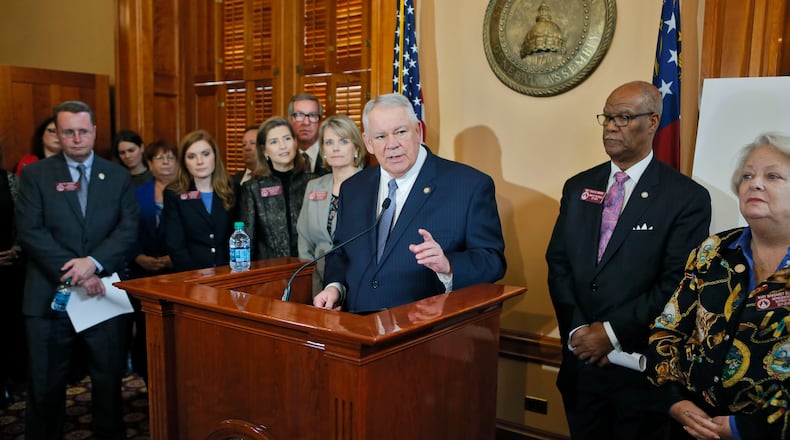There are times when it's right and proper to stop, look back at where we've been, and acknowledge the new territory before us. This is one of them.
For the first time, in the spring, summer and fall of 2018, commuter rail will be a legitimate campaign and policy issue in suburban Atlanta — not just the racial wedge it has been for the last half-century.
Yes, some Republicans are and will remain wary. But too many others have boarded the train, so to speak, to dismiss transit as a passing political fad that might fade, should Amazon.com decide to locate that second headquarters elsewhere.
You can credit House Speaker David Ralston, R-Blue Ridge, as the man who has changed the conversation. His transportation crew unveiled its work on Wednesday.
House Bill 930 would boost state funding for public transportation by tens of millions of dollars, and unify a dozen and more fiefdoms served by bus and rail. In his presentation, House Transportation Chairman Kevin Tanner, R-Dawsonville, declared a long-running battle to be at an end.
“The state specifically wants to acknowledge MARTA, along with Fulton, DeKalb, Clayton and the city of Atlanta for their 40-year investment as the region’s transit backbone,” Tanner said. He then nodded to the other side: “This is not about forcing counties to take MARTA. This is not about forcing counties to provide any transit service they’re not willing to provide.”
A Senate version of the transit revolution followed the next day, courtesy of another Republican champion, state Sen. Brandon Beach of Alpharetta.
Both bills envision a state-run umbrella over the enterprise called “the ATL.” And yes, that’s a designation the hip-hop crowd has popularized. But trust me, “the ATL” has its roots in an airport code that has been slapped on every suitcase leaving or coming into Atlanta at least since the 1960s. It fits.
But back to Ralston and the debut of HB 930. I once matriculated under Cold War scholars who paid great attention to photographs of Mao, Brezhnev & Co., and what might be learned by studying the people positioned around them.
It is a hard habit to break — no offense intended, Mr. Ralston.
Last Wednesday, two veteran Democrats, state Reps. Calvin Smyre of Columbus and Mary Margaret Oliver of Decatur stood at the House speaker’s left.
The crowd at Ralston’s right was more interesting. In addition to Tanner , there were four other House members, all Republican: Beth Beskin of Atlanta; Deborah Silcox of Sandy Springs; Meagan Hanson of Brookhaven; and Tom Taylor of Dunwoody, the chairman of the Legislature’s MARTA oversight committee.
Behind them were Charlotte Nash, chairman of the Gwinnett County Commission; and Bob Ott, the Cobb County Commissioner whose district contains the Atlanta Braves stadium. Both Nash and Ott are Republican.
You can see where I’m going. All but Tanner represent pieces of north metro Atlanta.
Nash was the most effusive. “We’re at the point — we know we have to make significant investment in order to expand transit in Gwinnett County significantly,” she said. The chairman acknowledged that she won’t have a vote on the legislation.
“But maybe I can talk to some of the people that do,” she said.
Ott, the Cobb commissioner, was more circumspect. He called the bill “a positive step forward.” And yet he expressed particular interest in continued efforts — “especially in the southern part of the county.”
Democrats are ready to embrace the issue, and that should be no surprise. “It’s been a long time since this has been a serious issue, where we’ve had an opportunity in Cobb to make it happen,” Michael Owens, chairman of the Cobb County Democratic party said. “If Democrats are not at the table with this — then we could be left on the outside looking in.”
As mentioned above, at least three House Republican incumbents from metro Atlanta could be defending their support for transit come November. (Taylor, the MARTOC chairman, is not running for election.)
But those Republicans who may have to weather a primary fight are still looking for permission. Attorney Matt Bentley is running for the House seat being given up this year by Rich Golick of Smyrna.
“Atlanta needs real solutions to its traffic woes, but people are tired of ever-increasing taxes,” Bentley said in an email. “I would not support the tax increase, but I would support any measure that is accepted by the will of the people through voting.”
Republican Leah Aldridge, a business owner and attorney, wants to reclaim the Senate District 6 seat lost last year to state Sen. Jen Jordan, D-Atlanta. The district straddles south Cobb and Buckhead. “Blindly supporting a 1 percent sales tax on each everyday purchase …without first talking to the residents of our community is backwards,” Aldridge said, also via email.
At the state Capitol, Jordan responded to the jab in person. Jordan does think transit is a viable campaign topic. “I know because everyone I talk to, in Fulton County and in Cobb County, is in favor of some kind of transit,” she said. “And so, at the end of the day, the idea that I’m making decisions for my constituents is not true.”
Jordan has scheduled a town hall meeting in Smyrna for Feb. 26. Ott, the Republican Cobb County commissioner, will be there, she said. So will Democrat Lisa Cupid, another Cobb commissioner. Brandon Beach, the Senate transportation chairman, has been invited, as has Keven Tanner, the House transportation chairman.
“The whole idea is to sit down in a real conversation with the people that this is going to impact,” Jordan said.
Possibly, the meeting will be tedious. On the other hand, a serious, political-season discussion of how commuter rail might cross the Chattahoochee River, linking Cobb with MARTA and “the ATL,” would also something close to historic.
Dull and ground-breaking sometimes travel together.
About the Author
The Latest
Featured




